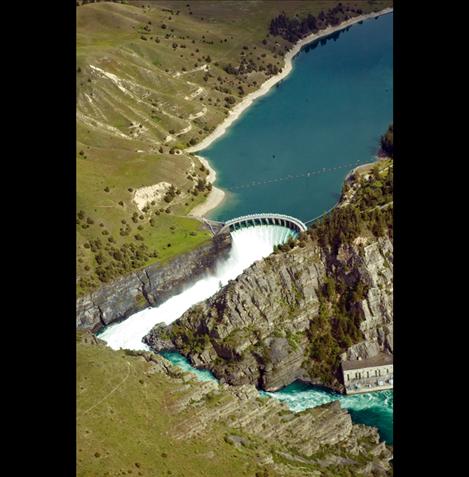Tax situation unclear as tribes negotiate purchase of Kerr Dam
Hey savvy news reader! Thanks for choosing local.
You are now reading
1 of 3 free articles.
Kerr Dam is a breathtaking spot, with tons of clear emerald water and plumes of white foam slamming more than 200 feet down into the Flathead River.
Kerr Dam’s beauty also serves a purpose —averaging production of 1.1 million megawatt hours of energy per year.
Located five miles southwest of Polson along the lower Flathead River, the concrete dam is 541 feet long and 204 feet high.
Kerr Dam is privately owned and licensed by PPL LLC and the Confederated Salish and Kootenai Tribes. The dam regulates the top 10 feet of Flathead Lake, and is an element of the Columbia River Basin system, with 1.2 acre feet of that top 10 feet as controlled storage for the CRBS. It’s governed not only by license, but also by flood control and fisheries requirements and by federal, state and local agencies.
The land on which Kerr Dam was built belongs to the Confederated Salish and Kootenai Tribes. Although there was tribal opposition when construction of Kerr Dam began on May 23, 1930, the CSKT did not have an established government until tribal members approved the CSKT constitution and bylaws on Oct. 4, 1935.
The tribes were not consulted on the proposal for building a dam, and ultimately protested construction of a dam at the falls, in consideration of the cultural importance at the site, according to energykeepersinc.com website.
At first the CSKT did not benefit financially from the dam, but “after much protest and litigation, ultimately the tribes would successfully negotiate a share of the proceeds,” according to “The Twists and Turns of Acquiring Kerr Dam,” an article on the Energy Keeper’s website.
That share of the proceeds was an annual land use fee Montana Power — and now PPL Montana — was required to pay the tribes. As an example of the amount, in 2013, the tribes received $19 million for the annual land use fee. That land use fee has been a large part of the yearly tribal budget, and will continue to be even after the expected date for CSKT to exercise their option to take over Kerr Dam in September 2015.
When and if CSKT purchases the dam, they will be the only tribe in the United States to own a major hydroelectric facility.
CSKT formed Energy Keepers, Inc. in 2012 to manage the acquisition.
“(Forming Energy Keepers, Inc.) is a prudent business decision,” said Energy Keepers, Inc. CEO Brian Lipscomb. “Any business has risks and this corporation isn’t immune.”
According to Lipscomb, four tribal operator trainees are already working with PPL in Great Falls and at Kerr Dam, and other training agreements are in the works.
Energy Keepers, Inc. is a section 17 corporation, an Indian reorganization corporation, which allows tribes to set up businesses that are autonomous from the government, Lipscomb explained.
Since Energy Keepers, Inc. is a separate entity from the tribes, the business will continue to pay the annual land use fee to the CSKT.
However, Section 17 corporations are not required to pay taxes, and that will leave quite a hole in the Lake County budget, causing area residents to wonder what will happen.
In 2013, PPL LLC paid $978,178.79 in taxes to the county; that money filtered into the county’s coffers for schools, fire, roads, sanitation and law enforcement.
When the tribes purchase the Kerr hydroelectric project outright, the tax revenue paid by PPL will end.
There has been discussion between the CSKT Tribal Council and Lake County about the tribes reimbursing Lake County for lost tax revenue, according to the Lake County Commissioners, but no specific amount has been discussed.
CSKT Tribal Chair Ron Trahan said the council will discuss the issue, but no decision has been made.
Not surprisingly, Lake County commissioners are aware of and are discussing the subject, according to commissioner Ann Brower. They’ve also talked with Montana Senator Jon Tester and former Senator Max Baucus’ aides “in depth about the issue we face,” said Lake County Commissioner Bill Barron, but they have come up with no solutions.
“The (CSKT) tribes are a huge economic driver for the county, but none of that money goes into infrastructure,” Barron said.
Lake County Schools will be hit hardest since they received $619,847 in PPL taxes in 2013.
The schools can apply for federal impact aid money, Barron said, but there is no impact aid for county services or roads.
“The federal government recognizes there is an impact on our schools, but not on our roads,” he added.
Lake County Commissioner Gale Decker said the commissioners do have the ability to make up that lost revenue with property tax assessments.
Currently the CSKT are in arbitration with PPL regarding the price tag on Kerr Dam, with a $31 million difference in opinion. An arbitration ruling is expected by March 5, which will pave the way for CSKT ownership of Kerr Dam.
















